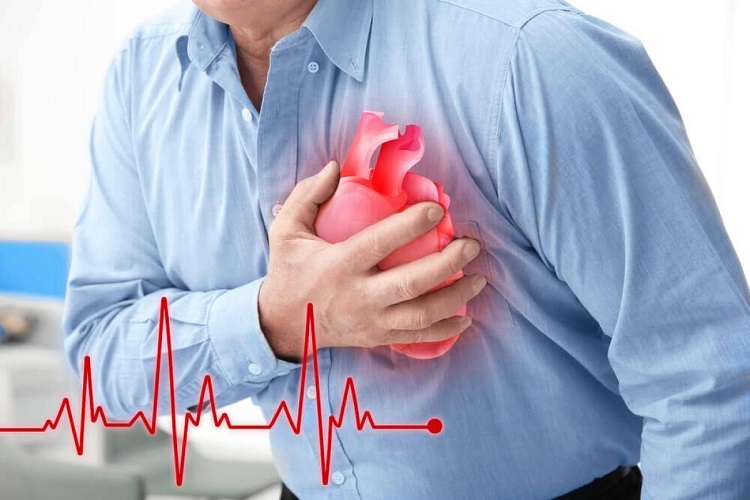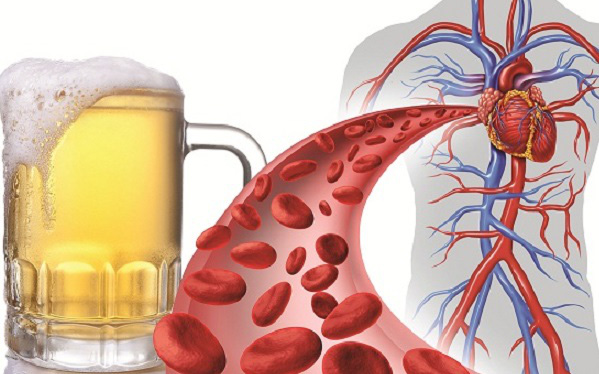Dietary notes that heart failure patients should follow so that the disease does not get worse
1. What are the common signs of heart failure patients?
Heart failure is a condition in which the heart muscle is unable to contract properly, causing the heart to not be able to pump enough blood to meet the needs of the body. The onset of heart failure can happen suddenly or happen over time. Most heart failure is caused by another medical condition, such as high blood pressure, coronary heart disease, cardiomyopathy, or an irregular heartbeat.
Symptoms of heart failure depend on the severity and type of heart failure. Depending on which side of the heart is affected, symptoms will vary.
In mild cases there may be no symptoms, unless strenuous physical work is performed. The most common and often first noticed symptom is shortness of breath, especially during routine activities such as walking up stairs.
As heart failure progresses and the heart becomes weaker, symptoms often get worse, including:
– Shortness of breath
– Tired
– Dry cough
– Wheezing
– Loss of appetite
– Swelling of ankles, feet, legs, abdomen and veins in the neck
– Weight gain
– Difficulty exercising
– Need to urinate often
– Inability to sleep when lying flat
– Difficulty concentrating
– Fingers and lips are bluish
Early signs of heart failure include: fatigue, shortness of breath on exertion, frequent urination at night, cough, swollen ankles, fast heartbeat or palpitations.
However, these signs are sometimes not obvious. Therefore, patients should not be subjective but need to go to a specialized medical facility for examination and necessary tests to get an accurate diagnosis and timely treatment measures.

If there are signs of heart failure, the patient should see a doctor soon.
2. Lifestyle and nutrition have an important influence on heart failure
Although some conditions that can lead to heart failure are present at birth or cannot be prevented, lifestyle and nutritional factors play an important role.
Factors that increase the risk of stroke and heart attack such as: smoking, drinking a lot of alcohol, eating foods high in fat and cholesterol, sedentary …
Evidence shows that following a healthy lifestyle can reduce the risk of heart failure. Maintaining a healthy weight, exercising, limiting alcohol intake, eating a healthy diet, and not smoking have all been shown to reduce some of the main risk factors for heart failure, including coronary heart disease and diabetes. sugar and high blood pressure.
According to MSc. Dr. Van Duc Hanh, Vietnam Heart Institute, heart failure patients can now live a healthy life and integrate into a normal life if heart failure is properly treated. However, there are many risk factors that promote acute heart failure, the most common are:
– Quit taking medication or take medication irregularly. Especially give up medications for heart failure, high blood pressure, diabetes…
– Using drugs that cause damage to the heart muscle in patients with heart disease such as anti-inflammatory pain relievers, corticosteroids or cancer treatment drugs…
– Patients with acute coronary syndrome, hypertensive emergency, pericardial effusion or mechanical events in the heart.
– Infections, such as upper or lower respiratory tract infections, pneumonia…
– Other factors such as: acute lung disease, increased sympathetic activity…
– In particular, an unreasonable diet such as: Eating too much salt (eating a lot of fish sauce, salt…), drinking a lot of alcohol, beer… can promote heart failure.
According to MSc.BS. Le Thi Hai, former director of the Center for Nutrition Examination and Counseling, National Institute of Nutrition, when suffering from heart failure, in addition to taking medicine as prescribed by a cardiologist, the diet for heart failure is also It is very necessary and contributes to limiting the progression and complications of the disease, reducing symptoms of shortness of breath, fatigue, chest pain, cough, edema…
Therefore, for patients diagnosed with heart failure, besides taking medication as prescribed by the doctor, it is necessary to adjust lifestyle and diet to control symptoms and improve quality of life.

Drinking too much alcohol can make heart failure worse.
3. What should heart failure patients eat?
3.1. Eat healthy food
There are a variety of heart-healthy foods including: vegetables, fruits, whole grains, fish, low-fat dairy, lean meats, etc.
Heart failure patients should eat a lot of vegetables and fruits that contain a lot of fiber, vitamins and antioxidants that are good for heart health, reduce cholesterol absorption, limit the formation of atheroma.
Green vegetables, fruits are also foods that contain natural antioxidants that are good for heart health. Some fruits that are good for cardiovascular disease such as grapefruit can reduce blood fat, tomatoes can reduce the risk of cerebrovascular accident…
In the daily diet, heart failure patients should prioritize foods rich in fiber such as cereals, especially whole grains. This type of food has nutritional value and high fiber content that helps with good digestion, blood sugar control, and blood pressure regulation.
Patients should eat fish, poultry (with the skin removed), lean meat or foods made from low-fat protein sources such as eggs, canola oil, soybeans… Do not eat too much protein derived from red meat, animal organs, salted meat…

Patients with heart failure should prioritize foods rich in fiber such as vegetables, whole grains.
3.2. Eat foods rich in potassium
A diet rich in potassium has been shown to lower blood pressure, reducing the risk of heart attack. People with heart failure often use diuretics to reduce the amount of potassium in the body. Therefore, it is necessary to supplement potassium by eating foods rich in potassium such as: lean pork, beans of all kinds, tomatoes, cabbage, broccoli, avocado, grapes, bananas…
3.3. Low fat milk
Milk is a good source of essential minerals like calcium, magnesium and potassium that your body needs to support heart health.
Research shows that consuming low-fat dairy is associated with a reduced risk of high blood pressure and a lower risk of stroke.
Low-fat dairy can also help the body fight chronic inflammation, a condition that has been linked to an increased risk of heart problems such as coronary artery disease, stroke, peripheral vascular disease, and cardiomyopathy. .
4. Foods that heart failure patients need to limit
4.1. Limit salt and control water intake
For patients with heart failure, eating a lot of salt will increase water retention and edema, adversely affecting the disease. Therefore, it is necessary to minimize the amount of salt used in the diet, the lighter the better. The average amount of salt per day should not exceed 2g. For patients with severe heart failure, salt should be completely eliminated. However, it should be noted that the amount of salt restriction or salt reduction depends on the specific condition and severity of the disease and therefore, the patient should strictly follow the instructions of a specialist.
4.2. Fastfood
Processed fast foods such as canned foods, cold cuts, bacon, sausages, sausages, ham, instant noodles, bread, cakes, carbonated soft drinks, etc. often contain a lot of salt and substances. Fat, sugar, additives, preservatives increase the risk of obesity, high blood pressure and cardiovascular disease.

Processed foods are not good for people with heart failure.
4.3. Red meats
Red meats including beef, veal, lamb… contain very high levels of saturated fat, which increases bad cholesterol, which is bad for heart health. Therefore, heart failure patients should limit these types of meat.
4.4. Quit drinking alcohol, beer, don’t smoke
The more alcohol and beer you drink, the more dangerous it is for people with heart disease such as causing high blood pressure, arrhythmia, coronary heart disease, dilated heart muscle leading to heart failure and making the condition worse.
Cigarettes contain nicotine, which stimulates the heart to work harder, causing increased blood pressure, shortness of breath, chest tightness, and chest pain for patients with heart failure.
Therefore, heart failure patients should minimize, it is best to quit drinking alcohol and not smoking to protect their health and control their disease.
at Blogtuan.info – Source: Afamily.vn – Read the original article here


